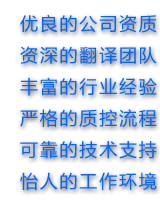英语翻译技巧(听课笔记)
定语从句:定语从句是由一些关系代词或者关系副词引导的从句组成,用来修饰名词中心词。
Person has pieced togethter the workd of hundereds of researcher around the world to produce a unique millennium technology calendar that gives the latest date when we can expect hundreds of key breakthrough and discoveries to take place. 皮而森 汇集了...生产出独特的千年历,这种千年历(它)能够... 定语的翻译要特别注意位子上的变化,即:如果是单词修饰名词就放在中心词的前面,这和汉语的词序是一样的;如果定语太长,定语就要放在中心词的后面,这时就要注意断句,重复先行词,例如:
1.I have the same problem as you concerning the learning of English 在学英语的问题上,我和你有同样的问题。
2.She has a perfect figure. 她身材不错。
3.This is indeed a most pressing problem. 这的确是一个非常棘手的问题。
4.The only other people who knew the secret were his father and mother. 别的知道这个秘密的人就是他的父母。
5.The effective work of maintaining discipline is usually performed by students who advise the academic authorities 有效的维持纪律通常是由一些学生来做的,而这些学生则负责给学校的领导提建议。
6.The nomads who made these markings lived by hunting a d fishing during the last Ice Age which began about 35,00 B.C. and ended about 10,000 B.C. 作出这些刻记的游牧人,依靠狩猎和捕鱼生活在冰河时代的晚期。这段时期大约始于公元前35,000年而结束于公元前10,000年。
7. For several hundred years, cases have been reported of children who have been reared in the wild by animals kept isolated from all social contact. 在过去的几百年中,已经有记载说,确实有被动物养大的与世隔绝的狼孩的存在。 另外,翻译成汉语时还要注意未省略关系代词和关系副词的定语从句, 翻译时所遵守的原则和上述的一样:关系代词引导的定语从句:
8.He is the very person (whom) I’m looking for. 他正是我要找的人。
9.This is the flexible policy that our government has pursued consistently. 这就是我们政府一直追求的灵活政策。
10.Those whose families cannot afford board and expenses can be allowed to receive scholarship. 那些家里提供不起食宿的学生可以得到奖学金。
11.There are forms that occasionally occur which should not be taught to students. 有些形式是不能告诉给学生的。 关系副词引导的定语从句:
12.I took Mr. John to the village, where I had spent my carefree childhood. 我把约翰先生带到我度过无忧无虑童年的乡村。
13.I still remember the time when we studied in the same university. 我还记得我们一起上大学的日子。
具体翻译来说,定语从句的翻译可分为限制性和非限制性定语从句两种,翻译成汉语时不论是在语序方面还是重复先行词方面都有一定的讲究: 限制性定语从句的翻译可分为以下几方面:
1.前置:这种定语从句一般比较短,翻译起来比较方便,和汉语的词序完全一样,例如:
a.This is the finest weather that I have ever seen this month. 这是这个月我所看到的最好的天气。
b.Our two countries are neighbors whose friendship is of long standing. 我们两国是友谊长存的友好邻邦。
c.Teachers generally like the students who achieve high scores in tests. 老师通常喜欢考试中成绩好的学生。
d.他不是一个轻易服输的人 He is not the one who will give up easily.
以上的这些例子告诉我们,如果定语很短的话,我们可以把他象汉语一样放在中心词的前面。但是,有的时候,如果定语太长,读起来就不符和汉语的习惯,因此,往往要后置,重复先行词,这就是下面要提到的定语从句的 “后置” 问题,例如:
2.后置:
a. Misers are often lonely and obscure men whose wealth is revealed only after their death. 吝啬鬼经常是看起来年很孤单、不为人所主意,可他们的财富只有等到他们死了以后才 暴露出来。
3.“综合性”的翻译法。综合性”的翻译就是,翻译时不需要关系词,其中的关系完全靠上下文的意思来表现出来,例如:
a.This is the place where the accident occurred. 这就是发生交通事故的地方。
b.The person who delivered the letter to him is his neighbor. 他的邻居把信交给了他。
c. There is a big oak tree that stands just in front of the village. 村子前面有棵大象树 d.Most of our patients welcomed another human being with whom they could talk openly, honestly, and frankly about their trouble. 大多数病人想找人坦率、诚实地倾诉他们的苦衷。
非限制性定语从句:这里,也可以分为以下几种:
1.前置:
a. We need a chairman, in whom everyone has confidence 我们需要一个人人都信赖的主席。
b.The worldly well-known actor , who had been ill for two years, meet thunderstorm applause when reappeared on the stage. 那个病了很多年的著名演员,一上台观众就报以雷鸣般的掌声。
c. Piccaso, whose works inspired many artists, lived until he was a ripe old age. 毕加索的作品曾鼓励了很多人,后来年纪很大时,作品也日趋成熟。
2.后置:这里包括:
重复先行词, 译成并列分句。这是比较常见的翻译方法:
a.He deposits a little sum of money in the bank, by which means he hopes to deal with any potential emergency easily. 我们每个月都在银行里存一些钱,这样,碰到有任何危机时,我们就可以应付了。
b. A table has four legs, one of which is broken. 桌子有四条腿,其中的一条腿是坏的。
c. Living in the central Australian desert has its problems, of which obtaining water is not the least. 生活在澳大利亚中部有很多问题,其中取水还不算最艰苦的。
d.He decided to resign, which is the best thing he could do under the circumstances. 他决定辞职,而这是他目前所能做的最好的事。
e.He is late for class today, as is often the case. 他今天迟到了,而这是经常的事。 以上的句子在翻译成汉语后,要重复先行词。其中的“which”可以是指前面的整个句子,也可以单指某个先行词。
3.省略先行词这种句行就象前面讲的“综和性”翻译一样,直接把整个句子的意思讲出来,例如:
a.The two universities signed an agreement, under which they would exchange students and scholars. 这两个大学,签定了协议,决定交换学生和学者。
b.He caught a young soldier coming to the farmhouse , whose face turned pale for too much loss of blood. 他看见一个士兵走进农舍,脸色因失血过多而苍白。
c. He passed the exam, which can be read from his the light on his face. 我从他脸上就可以看出他已通过了考试。
d. He arrived at the railway station in time , which is expected . 他果然准时到了火车站。
4.译成状语从句有些作定语的句子听起来却有点象状语从句,因此翻译时可以将其译成状语似的从句:
a.You should take advantage of the opportunity to learn English well, which is very valuable.(原因)你应该利用这个机会好好学习英语,这太重要了。
b.We examine the quality of our products, which is why they are so reliable.(原因)我们检验产品很仔细,因此产品都很可靠。
c.I never believe the stories, which is appealing.(让步)我从不相信他所说的故事,即使它很动听。
5. “as”引导的句子: 除了以上这些例子以外,还有一些特殊的由 “as”引导的句子, 翻译时可参考“as”的比 较结构从句:
a. He is not such as fool as he looks 他并不象看上去的那么傻。
b. They were not such questions as could easily be disposed of. 这些问题可不是那么容易就能处理好的。
c. It wasn’t such a good dinner as she had promised us. 这顿饭可没有她向我们说的那么好。
——选自:昆明翻译公司
译声昆明翻译公司目前是国内专业的翻译机构之一,译声昆明翻译公司秉承“诚信 专业”的服务理念,为国内外客户提供一流翻译服务。了解更多信息:请直接致电:400-600-6870咨询。
发表评论:













